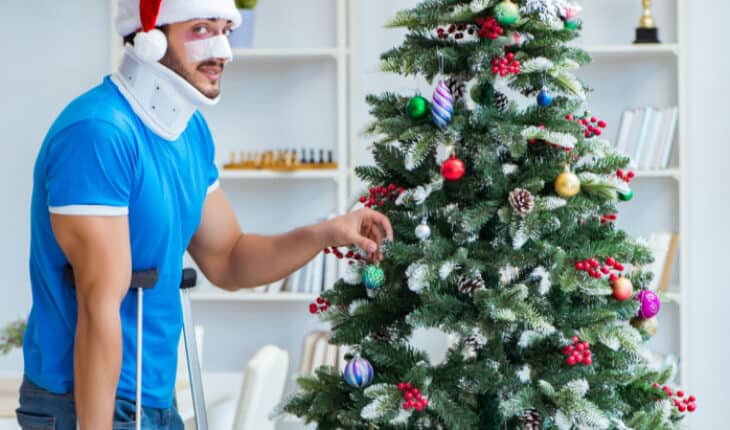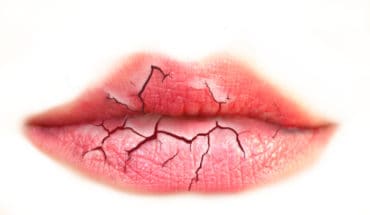The one place you don’t want to end up at Christmas, is the Accident and Emergency Department! Christmas is a peak time for increased stress and accidents, for both humans and pets. According to RoSPA more than 80,000 people go to A&E each year for Christmas-related accidents and over 6,000 of these need to be admitted. Decorations, fires, new toys, visitors, cooking and houses packed with over-excited children and extra animals present a lot of potential hazards. Factor in the additional seasonal stress and alcohol and you can start to understand how people fall foul of the festive season.
We have put together an essential guide of common incidents to help you avoid becoming a Christmas statistic. Read our top tips to keep you and your family safe over this Christmas period.
1. Allergies
Christmas is a time when people with food allergies need to take extra special care. The ingredient list of pre-packed food should list all major allergens, but be cautious with catered food.
Chocolate treats for children, such as those you hang on the Christmas tree, may end up separated from their packaging. Some of these could contain nuts or possible nut residues. Even if there is no nut warning, there may be a risk of cross-contamination.
2. Dangers of Alcohol
Alcohol can reduce one’s risk awareness and inhibitions. Accidents are more likely to happen in the kitchen and the home if you have overdone the alcohol. Space drinks out with non-alcoholic ones and the cook should refrain from drinking alcohol until the food is on the table.
If someone has collapsed having drunk too much; check they are breathing and then roll them into the recovery position to keep their airway clear. Someone should stay with them at all times, this is particularly important if they are vomiting.
At the end of the day make sure any residual alcohol is emptied out of glasses as children could drink the remains and are often the first down the morning after a party.
Never drink and drive.
3. Choking
Glass and fragile decorations should be out of reach of toddlers and pets. Novelty decorations, such as stuffed Santas, reindeer and snowmen that may look like toys do not have to comply with toy safety standards and may be dangerous. Keep them out of the reach of children and make sure you know what to do if your child does start choking.
Small parts from toys or gadgets, novelties from crackers or even burst balloons can easily become a choking hazard for children.
4. Decorations
RoSPA revealed more than 1,000 people each year are hurt while decorating their Christmas tree, usually whilst fixing decorations to the highest branches.
Another survey showed 2.6million people have fallen while using unstable chairs or stools whilst putting up decorations. Use a ladder.
And 1 in 50 people have fallen from the loft when getting decorations down. Don’t do this job alone, have someone to hand the decorations down to.
Glass decorations should be placed out of the reach of toddlers and pets. Children and pets can be hurt if they bite into glass baubles
5. Fairy Lights
A staggering 350 people a year are injured by Christmas tree lights, including falls while they are being put up, children swallowing the bulbs, and electric shocks and burns.
Test your lights and the wiring before you put them up. If necessary, buy new ones that meet higher safety standards, look for BS Kitemark. One in 40 people have suffered an electrical shock due to badly wired Christmas lights.
Don’t overload sockets as it can lead to overheating and electrical fires.
Switch off any electrical decorations at night and make sure your guests also know how to do so.
Get your chimney swept if you are planning on having a festive open fire.
Avoid cables being a tripping hazard.
RoSPA reports that between 1997-2010, 26 people died as a result of watering their Christmas tree with the lights on. Unplug them first.
Interested in an Essential First Aid for all ages? Click here
6. Festive flames and fires
Over the Christmas period there is a huge increase in house fires. People are 50% more likely to die in a house fire than at any other time of the year.
Keep any Christmas cards, paper decorations and the Christmas tree away from heat sources such as candles, fires or heaters, as they can catch alight and burn easily
Check that your smoke alarms are working, including your Carbon Monoxide detector.
Tea lights should be an appropriate container to prevent burning through baths and televisions. Blow out candles before heading to bed.
Get your chimney swept if you are planning on having a festive open fire.
600,000 people have burnt themselves whilst roasting chestnuts on an open fire.
Want to know more how to avoid burns in the kitchen? Check out this article
7. Indigestion and food poisoning
Food poisoning is always a worry at Christmas. There are an estimated one million cases of food poisoning every year and this doesn’t rest for the festive season. So much so that the NHS has guidelines to cooking turkey safely.
If you are cooking turkey make sure you read the instructions carefully and never risk taking short cuts as it takes hours to cook the bird properly.
Undercooked turkey can cause salmonella poisoning, which can be life-threatening, especially for those who are very young, old or frail.
For more information about poisoning, click here
8. Kitchen
Hot food, boiling water and sharp knives can make the kitchen particularly hazardous.
According to recent survey: 49% of respondents have suffered an accident whilst preparing Christmas food, with 1 in 10 having spilled hot fat on themselves and 1 in 5 cutting themselves whilst preparing vegetables.
Try to keep everyone other than the cook, especially pets and children, out of the kitchen. One in ten children’s accidents happen in the kitchen.
Refrain from drinking alcohol until the cooking is finished and wipe up any spills as soon as they happen so people do not slip.
9. Stairs and Snow
Make sure you are careful when going on walks over Christmas. The ground can be very slippery and no one wants to spend Christmas in hospital after a bad fall. Alcohol, tiredness and excited children make the stairs an accident hotspot during Christmas. If you have guests staying who may be unfamiliar with the layout of the house and could fall down the stairs whilst going to the toilet at night, so leave a light on.
Make sure stairs are free from clutter. Children will be excitedly rushing around to find visitors and playing with their new toys, so remove any obstacles that could cause a trip or fall down stairs
10. Plants
While Holly and mistletoe might seem festive and romantic they are highly poisonous. Their berries contain toxic proteins that slow the heart rate and can cause hallucinations.
In addition, the orange berries of the Christmas Cherry can cause stomach pains, while the Christmas Rose can result in violent diarrhoea.
Check with your florist or garden centre whether the plants you’re buying are toxic. If they are choose something non-toxic or keep them out of the reach of children.
11. Poisoning and swallowing of corrosive batteries
Button batteries are found in many children’s toys and books. But while batteries in children’s products are covered by safety regulations and are required to have a screwed-down cover, many Christmas novelty items such as flashing Santa hats or musical cards are not. Be aware these may pose a risk to children.
Button batteries release corrosive acid that burns the inside of intestines, causing major internal bleeding. Ensure all batteries are safely secured inside toys, remote controls, cards and gadgets. If a battery is missing and you think it possible a child has swallowed it, take them to A&E immediately for an x-ray as lithium batteries can kill within hours. Buy from a reputable manufacturer. Duracell lithium coin cell (button) batteries are coated with Bitrex to deter children from putting them in their mouths.
Medicines are the most common cause of accidental poisoning in children, with everyday painkillers a frequent culprit. The contents of Granny’s handbag could prove lethal. Remind visitors to keep all medication secure and out of sight and reach, not left in an open handbag or counted out on a bedside table.
12. Toys
Be aware that when buying from market stalls or pop up shops, toys may be illegally imported and may not meet strict safety guidelines.
Always buy age appropriate toys for your little ones. Make sure there are no small parts that could be a choking hazard.
When opening presents ensure you have necessary scissors and screwdrivers. Many injuries occur on Christmas day with people battling to open difficult packaging as quickly as possible, using makeshift tools.
- What is a seizure? - 13th March 2025
- Febrile Convulsions and Seizures in Children - 13th March 2025
- Why women are less likely to receive CPR or survive cardiac arrest - 6th March 2025







